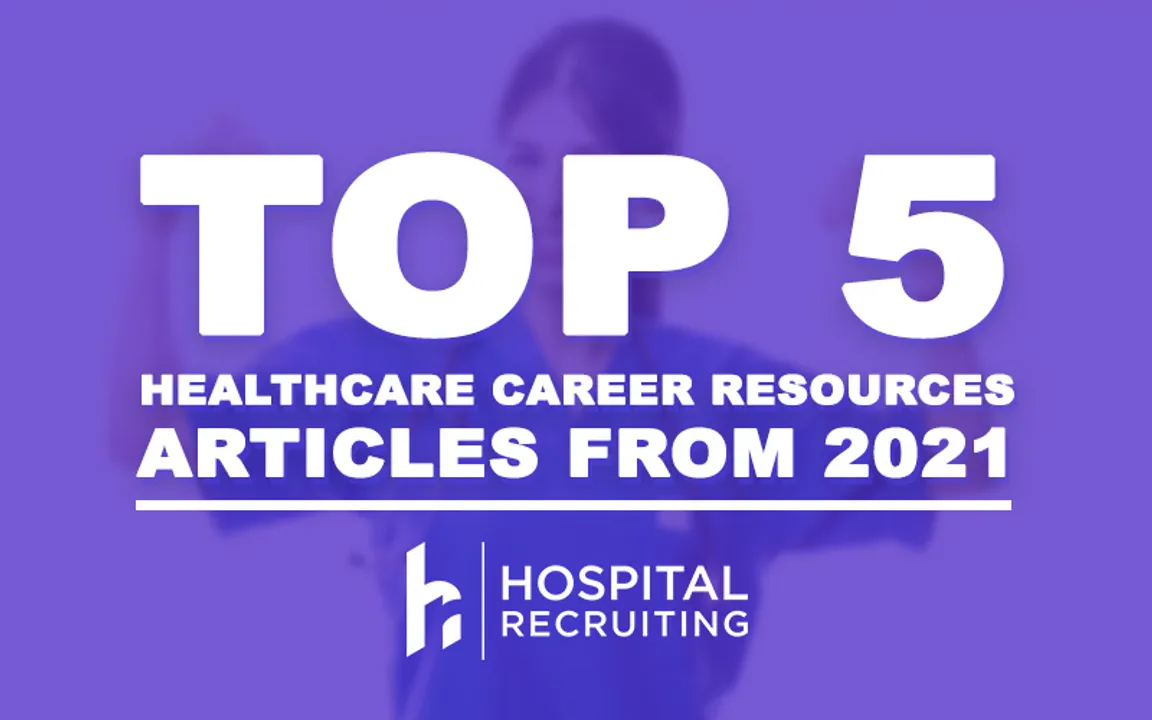Top Healthcare Career Resources Blogs of 2021

For nearly a decade, HospitalRecruiting.com has provided recommended reading on recruiting, job searches, and healthcare industry news. The Healthcare Career Resources staff seeks to give guidance on the changing landscape of the medical field as well as give a voice and platform to physicians, nurses, and other healthcare staff. 2021 was a big year for our blog with 70 new articles published, and as the new year begins, we'd like to take a moment to reflect on our top performing all-time publications for the year. So what were readers like you most interested to hear from us in 2021?
5) Job Search Advice for the New Nurse Grad
Originally published by Kyndall Brown, RN
At number 5 comes a nursing article for those new graduates looking to find their way in a career.
You've made your way through classes and walked across the stage, but even through this final breath of relief comes the next looming question: "now what?" One journey quickly transitions into another as years of school and classes fade into a more uncertain future. Kyndall Brown offers insight on finding your niche in the nursing field, and matching your personality with a nursing unit that fits your needs and style. Here's Brown's take on finding where you belong in the field.
When looking for a nursing job, especially your very first one, you should heed the words of my first nurse manager I ever had, a very wise and experienced woman. She said one should never choose a nursing job based on how “easy” or “low-stress” it appears to be, because when it comes to nursing, she said, that type of job doesn’t exist! No matter where you choose to go, nursing is a tough field, and you will face unexpected challenges every day, but if you made it through nursing school, you are tough enough to handle it. Furthermore, do not be alarmed if it takes you some time to find your “niche” in nursing. Sometimes you have to work in a few different areas to really find out what you like and don’t like. You will still gain invaluable experience and learn new skills in any field you choose to go into, even if you don’t remain in that specialty for a long time.
Key Takeaways from this article
- Deciding whether to start out on med/surg or find you own path
- Matching your personality to your nursing unit
- Considering your future goals when beginning your nursing career
- Finding your niche, because there are no easy jobs in nursing
4) Agency Nursing… the Good, the Bad, the Beautiful
Originally published by Tammy McKinney, RN
Another nursing article ranks in at number 4 on the list.
A lesser-known profession to many, this publication talks all about agency nursing. As the author McKinney points out, agency nursing is an often misunderstood field, and this article seeks to shine a light on some of the nuances of the profession. There are over 39,000 staffing offices for agency nurses in the U.S. alone, and yet the profession remains a mystery to many. Working for an agency as a nurse could see you working in rehab centers, inpatient psych units, group homes, long-term care facilities, and more. Although there are many benefits to working with an agency, it's important to point out the good, the bad, and the beautiful.
Despite any perceived flaws, however, McKinney does credit agency nursing for helping her land her dream job.
Without agency, I never would have landed my dream job. The experience of working in so many places and organizations gave me a perspective that I didn’t previously have. After a couple of years, I had nailed down EXACTLY what I wanted in a job and had met some nurses working in the field. I waited patiently for the perfect position to open up, and jumped on it. I’ve been there for about a year now and absolutely love it! I miss agency at times, but since I still travel to many local facilities to see patients, I often get to stop and say, “hi” to friends and patient’s that I miss! The real beauty is that I know my agency is always there. If our company closes its doors, or I find myself bored of the work, I can be working for agency the very next day! It’s a form of job security that you’ll find no place else!
Key Takeaways from this article
- The Good
- Schedule
- Pay
- Facility Choice
- Never Boring
- The Bad
- Less Desirable Assignments
- Assignment Changes
- Flying by the seat of your pants
- Availability Changes
- The Beautiful
- Great Networking
- Experience
- Travel Opportunities
- Buy Outs
*For more nursing resources, check out our other articles
3) Get Paid For The Work You Do: Why RVUs Are A Great Way To Go
Originally published by Russell Singleton, PA

At number 3 comes a breakdown of relative value units for determining your worth to an organization.
No matter where you work or at what point in life you find yourself, it is important to know your value. Knowing this value can mean leveraging your salary, landing a better job, and simply put, earning what you're worth. For those unfamiliar with the terminology, advanced practitioner Russell Singleton breaks down the concept of RVUs here.
RVUs or Relative Value Units are part of the formula Medicare uses to quantify the complexity of work and expense a practice generates seeing patients. RVUs account for three things: 1) expenses to the practice, 2) the actual work being performed by the provider, and 3) the cost of malpractice (the smallest component). We’ll focus on the part most pertinent to employed clinicians–the work component or wRVU.
Every type of encounter is assigned an RVU value by Medicare. A straightforward new patient visit at a PCP’s office might be worth roughly 1 RVU while a quick check-in from the hospitalist would be worth closer to 2 RVUs. Procedures are also assigned RVU values. A joint injection might be worth three quarters of an RVU while a vasectomy is 11 RVUs. These values are not affected by their reimbursements, and they cannot be amended by employers. They are meant to be representative of the work involved in providing that care.
While two insurers may not reimburse a procedure at the same level, when a clinician is reimbursed according to the amount of wRVUs generated, his/her compensation will always be the same. Therefore, assuming adequate demand for their services, the most control providers have over their production pay is what they’ll be reimbursed for each RVU and whether or not there is a production threshold on top of a base salary.
Key Takeaways from this article
- Value by percentage can be arbitrary
- Relative Value Unit Breakdown
- Negotiating Base and Bonus Salary with RVUs
- What is an RVU worth?
2) How to a Survive a Joint Commission Visit
Originally published by Angie Best-Boss, RN

Near the top of our list, just short of number one is another article for nurses.
Anyone who's worked in healthcare for a while knows the anxiety that strikes when you hear that "Jay-Co" (JCAHO, or the Commission on Accreditation of Healthcare Organization) is on the premises. Hospitals and other health systems employ JCAHO to evaluate their facilities to determine if they are up to standard with regulations. It's never fun when the bureaucratic authority knocks on your door to make sure you're doing what's expected of you, but if you sufficiently prepare for the upcoming visit, a JCAHO appointment doesn't have to be like pulling teeth.
Angie Best-Boss lays out an easy-to-follow action plan for any souls facing the prospect of a facility audit. To ease the concerns of those facing a Joint Commission visit, here she lays out the objectives of JCAHO clearly.
What does JCAHO care about?
Surveyors from JCAHO will ask questions that relate to their top priorities, including:
- Improving patient identification
- Improving communication between caregivers
- Improving accuracy of drug administration
- Improving drug documentation throughout the continuum of care
- Improving IV pump safety
- Maintaining accurate clinical alarms
- Eliminating wrong site, wrong patient, wrong procedure, or wrong surgery errors
- Reducing healthcare-acquired infections (HAIs)
- Reducing falls
- Addressing flu and pneumonia causes in older patients
- Reducing surgical or procedural fires
Key Takeaways from this article
- Getting ready for the appointment
- Pay attention
- Know what you don't know
- It's okay to not know
- Taking action
1) Career Options for International Medical Graduates
Originally published by Christiana Davis, MD

Our top performing article from 2021 (and the last few years as well) is all about career opportunities for international medical graduates.
Did you know that 28% of U.S. physicians are immigrants? With over a quarter the population of doctors in America originating from outside the country, it is evident the home of the brave is a trot line cast in the talent pool, collecting highly-skilled medical professionals from all around the globe.
The ECFMG (Educational Commission for Foreign Medical Graduates) conducts assessments to determine whether or not medical graduates from outside the U.S. are qualified for work in the country. Passing their exam is grueling, but it's only the first step in an arduous road. The hurdles to international graduates working in the states have proven too high for many, leading them to alternative careers. For the brave few willing to risk it all for this path, fortunately there are resources.
Christiana Davis, a working physician and international medical graduate consultant, suggests applying for a career training grant.
There are many grants available for educational expenses and career training. There is so much to choose from. Become familiar with funding agencies. Find out whom they fund. Look beyond government and federal grants. There are foundations and private sources that give grants for research and educational purposes. Most career training today can be done online, so you can essentially pace yourself. Trained as a clinician, I opted for a career in the biomedical sciences at the Children’s Hospital of Philadelphia and The University of Pennsylvania. I became a recipient of several awards (grants), including NIH’s National Research Service Award for training in Molecular and Cellular Biology. (This is one of the most prestigious awards in the sciences.) In this position, I acquired skills in writing scientific manuscripts and grant proposals. After my academic career, I transitioned to the pharmaceutical industry, where I contributed to new drug applications and other FDA correspondence. Now an entrepreneur, I currently offer a full range of services, including career coaching services, through my service-based business Consult To Aspire. A career training grant opened the door to many opportunities.
Key takeaways from this article
- Start by browsing the jobs on our website. Many offer visa sponsorship and opportunities for International graduates
- Apply for a career training grant
- Familiarize yourself with Responsible Conduct of Research
- For non-native English speakers, consider a speech coach
- Take a course in Introduction to the Principles and Practice of Clinical Research (IPPCR)
*For more international medical graduate resources, check out our other blogs.
Conclusion
This wraps up the best-of articles from 2021. We look forward to providing more educational and insightful healthcare content in the years going forward. If you've enjoyed the articles from our Healthcare Career Resources blog this year, consider opting into our mailing list to never miss a publication.
Happy new year!
Related Posts


